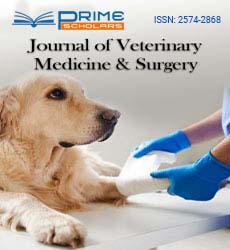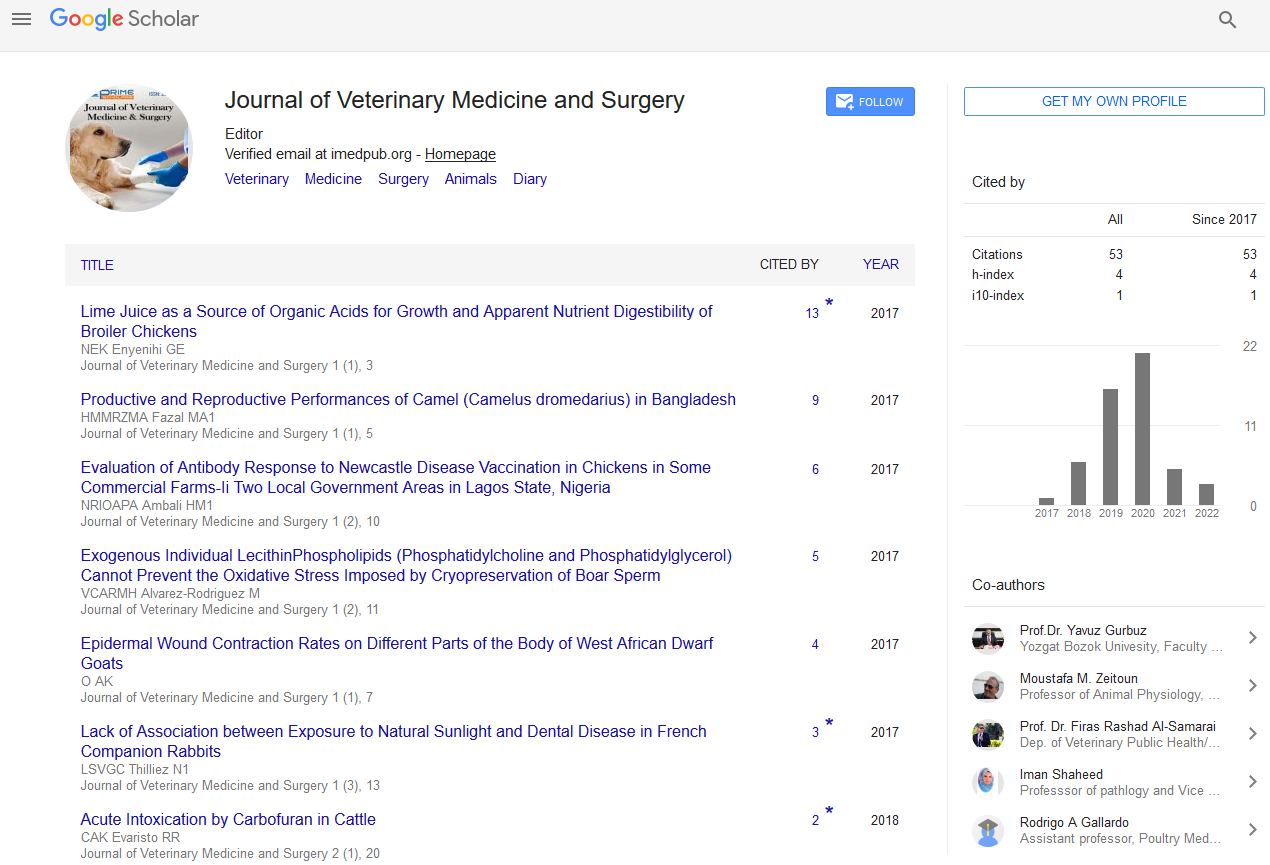Short Communication - (2023) Volume 7, Issue 3
Exploring the Diverse Types of Veterinary Medicine: A Comprehensive Overview
Jade Blythe*
Department of Veterinary Medicine, University of Calgary, Canada
*Correspondence:
Jade Blythe,
Department of Veterinary Medicine, University of Calgary,
Canada,
Email:
Received: 30-Aug-2023, Manuscript No. IPJVMS-23-19153;
Editor assigned: 01-Sep-2023, Pre QC No. IPJVMS-23-19153 (PQ);
Reviewed: 15-Sep-2023, QC No. IPJVMS-23-19153;
Revised: 20-Sep-2023, Manuscript No. IPJVMS-23-19153 (R);
Published:
27-Sep-2023, DOI: 10.36648/2574-2868.7.3.22
Introduction
Veterinary medicine encompasses a wide array of specialties
and disciplines aimed at maintaining the health and well-being
of animals. From preventive care to specialized surgical interventions,
veterinary professionals employ a range of techniques
to address the unique needs of different species. In
this article, we will delve into the various types of veterinary
medicine, highlighting the key aspects of each discipline and its
significance in animal healthcare. General practice veterinary
medicine forms the foundation of animal healthcare. General
practitioners, or veterinarians, play a crucial role in preventive
care, routine check-ups, and addressing common health
issues. These professionals are often the first point of contact
for pet owners seeking veterinary care. Services provided by
general practitioners include vaccinations, spaying and neutering,
dental care, and nutritional counseling. They also diagnose
and treat common ailments such as ear infections, skin conditions,
and respiratory issues. General practice veterinarians
build strong relationships with pet owners, offering guidance
on nutrition, behavior, and overall well-being. Diagnostic veterinary
medicine focuses on the identification and understanding
of diseases and conditions affecting animals. Veterinarians specializing
in diagnostics utilize a variety of tools and techniques
to uncover the root causes of symptoms and formulate effective
treatment plans [1,2]. Diagnostic imaging, such as X-rays,
ultrasounds, MRI, and CT scans, allows for a detailed examination
of internal structures.
Description
Surgical veterinary medicine involves procedures ranging from
routine surgeries, such as spaying and neutering, to complex
interventions like orthopedic and neurosurgery. Veterinary surgeons
undergo specialized training to perform various surgical
procedures, ensuring the safety and well-being of their animal
patients. Equine veterinary medicine is a specialized field dedicated
to the health and well-being of horses. Equine veterinarians
provide a wide range of services, including preventive care,
dentistry, lameness evaluations, and reproductive health management.
These professionals often work with performance
horses, racehorses, and companion horses, tailoring their care
to meet the unique needs of these majestic animals. Veterinary
care extends beyond traditional companion animals to include
avian and exotic species. Avian and exotic animal veterinarians
specialize in the health and well-being of birds, reptiles, small
mammals, and other non-traditional pets. These specialists
are trained to address the unique physiological and behavioral
characteristics of diverse species. Wildlife veterinary medicine
focuses on the health and conservation of wild animals
and their ecosystems. Wildlife veterinarians collaborate with
conservation organizations, wildlife agencies, and zoos to address
the health challenges facing diverse species in their natural
habitats or captivity. Emergency and critical care veterinary
medicine provides immediate medical attention to animals
facing life-threatening conditions or injuries [3,4]. These specialists
work in emergency veterinary clinics and hospitals, providing
around-the-clock care for animals in distress.
Conclusion
The field of veterinary medicine is multifaceted, encompassing
a diverse array of specialties tailored to the unique needs of
different animal species. From general practice to specialized
disciplines such as surgical, equine, avian, and wildlife medicine,
veterinary professionals contribute to the health and
well-being of our animal companions. Each veterinary specialty
plays a crucial role in advancing the overall field, ensuring
that animals receive the highest standard of care and that the
bond between humans and their animal companions remains
strong and enduring. As the field continues to evolve, ongoing
research, technological advancements, and a commitment to
compassionate care will shape the future of veterinary medicine
and contribute to the well-being of animals worldwide.
Acknowledgement
None.
Conflict Of Interest
None.
References
- Foster JD (2023) Nephrology in veterinary medicine. Kidney360 4(11):1641-1649.
[Crossref] [Google Scholar] [PubMed]
- Kuo KW, McMichael M (2020) Small animal transfusion medicine. Vet Clin North Am Small Anim Pract 50(6):1203-1214.
[Crossref] [Google Scholar] [PubMed]
- Danchuk O, Levchenko A, da Silva Mesquita R, Danchuk V, Cengiz S, et al. (2023) Meeting contemporary challenges: Development of nanomaterials for veterinary medicine. Pharmaceutics 15(9):2326.
[Crossref] [Google Scholar] [PubMed]
- Hochman L (2018) Photobiomodulation therapy in veterinary medicine: A review. Top Companion Anim Med 33(3):83-88.
[Crossref] [Google Scholar] [PubMed]
Citation: Blythe J (2023) Exploring the Diverse Types of Veterinary Medicine: A Comprehensive Overview. J Veterinary Med. 7:22.
Copyright: © 2023 Blythe J. This is an open-access article distributed under the terms of the Creative Commons Attribution License, which permits unrestricted use, distribution, and reproduction in any medium, provided the original author and source are credited.

